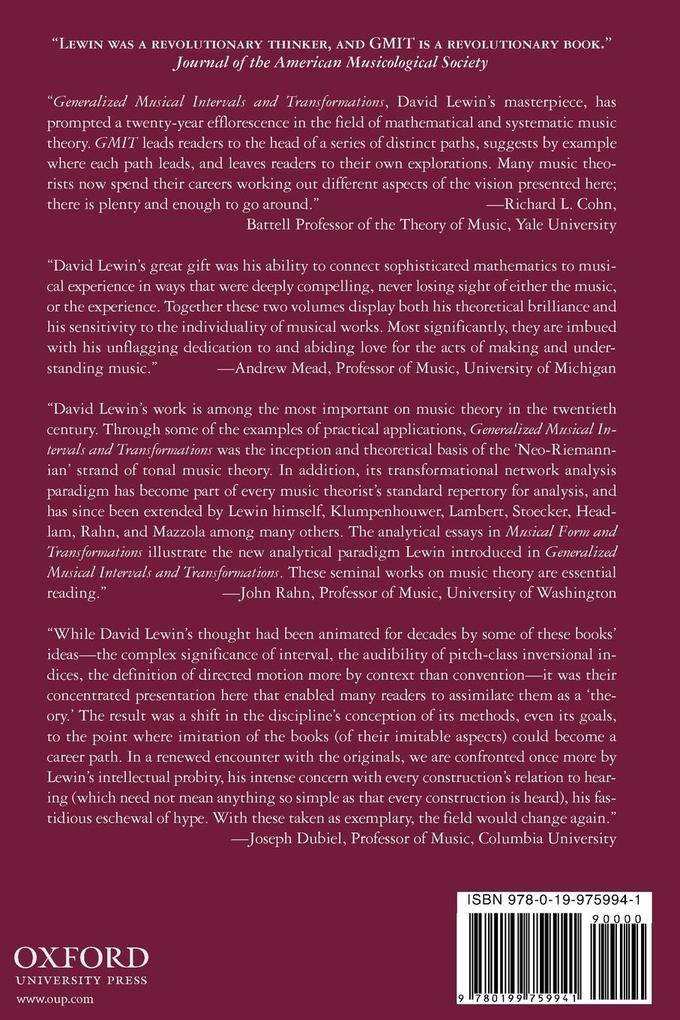
Zustellung: Mi, 16.07. - Sa, 19.07.
Versand in 5 Tagen
VersandkostenfreiBestellen & in Filiale abholen:
Generalized Musical Intervals and Transformations is by far the most significant contribution to the field of systematic music theory in the last half-century, generating the framework for the "transformational theory" movement.
Inhaltsverzeichnis
- Foreword by Edward Gollin
- Preface
- Acknowledgments
- Introduction
- 1.: Mathematical Preliminaries
- 2.: Generalized Interval Systems (1): Preliminary Examples and Definition
- 3.: Generalized Interval Systems (2): Formal Features
- 4.: Generalized Interval Systems (3): A Non-Commutative GIS; Some Timbral GIS Models
- 5.: Generalized Set Theory (1): Interval Functions; Canonical Groups and Canonical Equivalence; Embedding Functions
- 6.: Generalized Set Theory (2): The Injection Function
- 7.: Transformation Graphs and Networks (1): Intervals and Transpositions
- 8.: Transformation Graphs and Networks (2): Non-Intervallic Transformations
- 9.: Transformation Graphs and Networks (3): Formalities
- 10.: Transformation Graphs and Networks (4): Some Further Analyses
- Appendix A: Melodic and Harmonic GIS Structures; Some Notes on the History of Tonal Theory
- Appendix B: Non-Commutative Octatonic GIS Structures; More on Simply Transitive Groups
- Index
Produktdetails
Erscheinungsdatum
08. Oktober 2010
Sprache
englisch
Seitenanzahl
292
Autor/Autorin
David Lewin
Verlag/Hersteller
Produktart
kartoniert
Gewicht
478 g
Größe (L/B/H)
229/152/17 mm
ISBN
9780199759941
Entdecken Sie mehr
Pressestimmen
"Generalized Musical Intervals and Transformations, David Lewin's masterpiece, has prompted a twenty-year efflorescence in the field of mathematical and systematic music theory. GMIT leads readers to the head of a series of distinct paths, suggests by example where each path leads, and leaves readers to their own explorations. Many music theorists now spend their careers working out different aspects of the vision presented here; there is plenty and enough to go around."-Richard L. Cohn, Battell Professor of the Theory of Music, Yale University"David Lewin's great gift was his ability to connect sophisticated mathematics to musical experience in ways that were deeply compelling, never losing sight of either the music, or the experience. Together these two volumes display both his theoretical brilliance and his sensitivity to the individuality of musical works. Most significantly, they are imbued with his unflagging dedication to and abiding love for the acts of making and understanding music."--Andrew Mead, Professor of Music, University of Michigan"Lewin was a revolutionary thinker, and GMIT is a revolutionary book."--Journal of the American Musicological Society"David Lewin's work is among the most important on music theory in the twentieth century. Through some of the examples of practical applications, Generalized Musical Intervals and Transformations was the inception and theoretical basis of the 'Neo-Riemannian' strand of tonal music theory. In addition, its transformational network analysis paradigm has become part of every music theorist's standard repertory for analysis, and has since been extended by Lewin himself, Klumpenhouwer, Lambert, Stoecker, Headlam, Rahn, and Mazzola among many others. The analytical essays in Musical Form andTransformations illustrate the new analytical paradigm Lewin introduced in Generalized Musical Intervals and Transformations. These seminal works on music theory are essential reading."-John Rahn, Prof
Bewertungen
0 Bewertungen
Es wurden noch keine Bewertungen abgegeben. Schreiben Sie die erste Bewertung zu "Generalized Musical Intervals and Transformations" und helfen Sie damit anderen bei der Kaufentscheidung.










